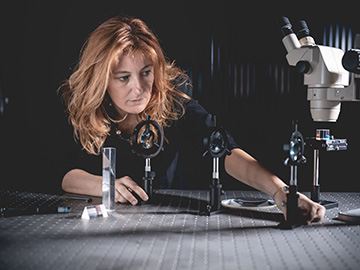
Antigone Marino
In this installment of Senior Member Insights, OPN talks with Antigone Marino—a researcher at the Institute of Applied Sciences and Intelligent Systems (ISASI) of the Italian National Research Council (CNR). Her research activities concentrate on the study of soft-matter optics applied to telecommunications, with a special interest in liquid-crystal technologies. Marino is a member of the original 2016 class of OSA Ambassadors. She is also a member of the OSA Foundation Board of Directors and of the Italian Physical Society.
What first interested you in pursuing science?
I approached science from an early age. When I was four, I destroyed my Smurfs radio-controlled car to understand how the electric engine worked. Now, what binds me to science is curiosity—the desire to understand how things work.
What aspect of your current work do you find the most interesting or exciting?
The dynamics. It’s impossible to get bored in my current work, as it is constantly evolving—not only the theories or the topics, but also, above all, the technologies that allow us to carry out the experiments.
The skills, technical and soft, of a scientist are constantly evolving. Professional growth in scientific research is almost guaranteed, and it’s exciting to know that there will always be something new to understand or discover. It’s like your favorite TV series never has the final episode—amazing!
What tips for successful networking do you have for early-career professionals?
Establish your own network, which may include that of your mentor or research group. But it must be yours. It is important to be part of a team and to know how to work in a team, but it is also essential to present yourself to the community as an individual. This is very important for an early-career professional who needs to find work.
What professional resources do you rely on to stay active and engaged with your field?
To stay active in my field, I participate in conferences, and I follow webinars. Above all, I work as a volunteer for various societies, such as OSA, the Italian Physics Society or the Italian Society of Optics and Photonics. Being part of a larger community allows me to broaden my vision and to understand how my research fits into a wider panorama.
What skills do you think are most important for someone interested in a career like yours?
I don’t know if it can be defined as a skill, but surely passion is the most important thing for a career like this. There’s no single skill—in this job you are asked to have a Swiss multi-tool of skills, so you can pull out the right one at the right time.
You need to know how to communicate the results of your research—by writing articles, speaking at conferences or even to stakeholders in your field. And, we must be good in computer science, programming, and now also in graphics. I could go on, but the most important ones, those skills to leverage, are those that best represent our nature. For example, for me, communication is the skill I feel I give my best self. Everyone has to find his or her own.
What’s the best career decision you’ve ever made, and why?
This question suggests that there is a moment in the professional lives of all of us that could change things. If so, surely my interview with IBM was decisive. I was hired to work with them, but I gave it up to start my Ph.D. At that moment, my path into the world of academic research began.
What advice do you have for young scientists who are discouraged about their current work or career path?
Don’t be afraid of being discouraged. Often, it is just a symptom of being out of our comfort zone, and that’s very positive. It is outside our comfort zone that we are most creative, and scientific research is creativity supported by technical skills. When discouraged, stop for a while and rely on the things that make you stronger.
What is one piece of advice that you wish you were given as a student/early in your career?
I have been very lucky, having had several great mentors when I was young. There isn’t a piece of advice that I feel hasn’t been given to me. If I had to give it myself, I would tell a student or an early-career professional to pay attention to their scientific, professional and personal reputation. We take it for granted, but it is a very delicate point, especially in the age of social media.
What habits do you frequently rely on that help you to succeed?
Brainstorming—I use it a lot, and not just for work. It helps me broaden my mind and see things from a different point of view to better understand if I’m communicating well or wasting time. It is a very useful tool on which you can rely even without specific training. Just be willing to compare yourself with others.
If you weren’t in the sciences, what would be your dream career?
I would be a photographer. Photography was the hook that made me bite to optics and, therefore, to scientific research. Photography is also a creative process that leverages technical skills—maybe all the arts are like that. When I take a nice picture, I feel happy in the same way as when an article is published, with the difference that many more people can read a photo.
